For an API Request I'm trying to setup an URLSession using a Proxy. For test purposes I'm using a public Proxy and an API responding the IP.
func makeRequestViaUrlSessionProxy(_ url: String, completion: @escaping (_ result: String?) -> ()) {
let request = URLRequest(url: URL(string: url)!)
let config = URLSessionConfiguration.default
config.requestCachePolicy = URLRequest.CachePolicy.reloadIgnoringLocalCacheData
config.connectionProxyDictionary = [AnyHashable: Any]()
config.connectionProxyDictionary?[kCFNetworkProxiesHTTPEnable as String] = 1
config.connectionProxyDictionary?[kCFNetworkProxiesHTTPProxy as String] = "142.54.173.19"
config.connectionProxyDictionary?[kCFNetworkProxiesHTTPPort as String] = 8888
let session = URLSession.init(configuration: config, delegate: nil, delegateQueue: OperationQueue.current)
let task = session.dataTask(with: request) {
(data: Data?, response: URLResponse?, error: Error?) in
if error != nil {
NSLog("Client-side error in request to \(url): \(error)")
completion(nil)
return
}
if data == nil {
NSLog("Data from request to \(url) is nil")
completion(nil)
return
}
let httpResponse = response as? HTTPURLResponse
if httpResponse?.statusCode != 200 {
NSLog("Server-side error in request to \(url): \(httpResponse)")
completion(nil)
return
}
let encodingName = response?.textEncodingName != nil ? response?.textEncodingName : "utf-8"
let encoding = CFStringConvertEncodingToNSStringEncoding(CFStringConvertIANACharSetNameToEncoding(encodingName as CFString!))
let stringData = String(data: data!, encoding: String.Encoding(rawValue: UInt(encoding)))
session.invalidateAndCancel()
completion(stringData)
}
task.resume()
}
Called by:
override func viewDidLoad() {
super.viewDidLoad()
makeRequestViaUrlSessionProxy("https://api.ipify.org?format=json") { string in
print(string)
}
}
It seems like the config is completely ignored because even with made up Proxy IP, the responded IP is always the actual devices IP
Any help is highly appreciated.
Edit: as suggested by User hasan83, taking "the HTTPS keys" seems not an option.

